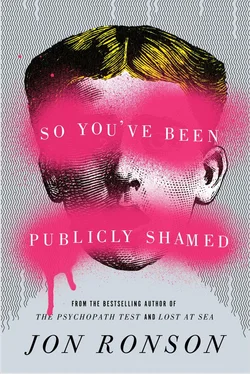MIKE DAISEY:No, not really.
IRA:Really? There was no part of you which felt like, OK, well, the hexane thing didn’t really happen when I was there. And did you feel like there was something that we would discover by talking to her?
MIKE:Well I did think it would unpack the complexities of, of like how, how the story gets told.
IRA:What does that mean, “unpack the complexities”?
MIKE:Well, it means that like the hexane thing, I think I’m agreeing with you….
MIKE:I believe that when I perform it in a theatrical context… we have different languages for what the truth means.
IRA:I understand that you believe that, but I think you’re kidding yourself. Normal people who go to see a person talk — people take it as a literal truth. I thought that the story was literally true seeing it in the theater. Brian, who’s seen other shows of yours, thought all of them were true….
MIKE:We have different worldviews on some of these things.
IRA:I know. But I feel like I have the normal worldview. The normal worldview is somebody stands onstage and says, “This happened to me,” I think it happened to them, unless it’s clearly labeled, “Here’s a work of fiction.”…
IRA:I have such a weird mix of feelings about this. Because I simultaneously feel terrible for you, and also, I feel lied to. And also, I stuck my neck out for you. I feel like I vouched for you. With our audience. Based on your word.
MIKE:I’m sorry.
The tone of voice in which Mike said, “I’m sorry,” sounded like that of a child — a gifted, difficult, maverick child who thought he was bigger than the school — being made to stand in front of everyone and get chastened until he changed. In those three syllables he seemed to shift from defiant to broken.
But then he was back online, his self-esteem apparently totally revived.
He felt proud to have recovered the way he did. “I’ve been obsessed with investigating literary scandals,” he told me. “Nobody ever comes back from those things. At the scale and intensity of what I experienced? Nobody comes out intact.”
“I know!” I said. “Did you know from the start you’d survive?”
“Oh no,” Mike said. “Oh no. I thought about killing myself.”
I looked at him. “Really?” I said.
“Everything was on the table,” he said. “I actively talked about killing myself. I actively talked about never performing again, just leaving the theater and never performing again. We talked about getting divorced. Very openly.”
“How was your wife during this?” I said.
“She was making sure I wasn’t alone,” Mike said.
“When was all of this happening?” I asked.
“The very worst part of the scandal was before anyone knew of the scandal,” he said. “There was a week between my interview with Ira and the show airing. During that week, I began to disassociate onstage. I was falling apart. I would freeze as I was doing the show. I would feel my mind take itself apart. That was the worst part. It was fucking terrible, the fear, and the feeling that you will dissolve.”
“What were you most scared of?”
“I was terrified that I would no longer be able to tell the narrative of my life,” Mike said, “that every time I performed onstage his judgment of me would echo forever, deciding who and what I was.”
“So what changed?”
Mike didn’t reply for a while. Then he said, “When Ira first asked me if I wanted to tell the story on his show, I thought, This is a test. If I really believe in this, then the cowardly thing would be to not do the story. If I bury it, nothing will change .” He paused. “I knew that the story would explode in the consciousness, and then it would explode for me.”
I frowned. “You’re saying you knew from the beginning that you’d be exposed?”
Mike nodded. “What happened on that lake showed me that there’s a door,” he said. “And the door is open a crack. And you can feel it. You can just die. You see? Once you accept that, it brings clarity. You want to do something in the world? Be willing to throw your life away. I was, ‘Fine. I’ll throw my life away. Fine.’”
“What about the risk that the scandal, instead of shining a light on what was happening in China, would turn the light off?” I said.
“I would have worried about that a lot,” Mike replied. Then he corrected his phrasing. “I worried about that a lot,” he said. “I was really worried about that.”
He could see me looking uncertainly at him.
“Look, nobody wants to hear that I am actually a heroic crusader and that I sacrificed myself,” he said. “Nobody wants to hear that narrative. But that is, actually, the narrative. I knew there was no way it would withstand the scrutiny of becoming a major story. I knew it was going to fail.”
—
I was sure I was watching a man in the process of building a fictional history for himself. In this new version of events, Mike had valiantly destroyed his reputation to save lives in China, like a suicide bomber. But at the time I felt I shouldn’t tell him that I’d worked this out about him. It seemed to be what was holding him together.
But I think he read all this in my face, because he suddenly said: “The way we construct consciousness is to tell the story of ourselves to ourselves, the story of who we believe we are. I feel that a really public shaming or humiliation is a conflict between the person trying to write his own narrative and society trying to write a different narrative for the person. One story tries to overwrite the other. And so to survive you have to own your story. Or”—Mike looked at me—“you write a third story. You react to the narrative that’s been forced upon you.” He paused. “You have to find a way to disrespect the other narrative,” he said. “If you believe it, it will crush you.”
• • •
I was glad Mike Daisey had found a way to have a life. But I don’t think his survival method was helpful advice for Jonah or Justine. They had no storytelling career to fall back on. There was no third narrative for them. There was just the one. Jonah was the fraudulent pop-science writer. Justine was the AIDS-tweet woman. They were tainted people and it wouldn’t take a sleuth to find it out. Their flaws were right there on the front page of Google.
Justine made good on her promise. Five months after our first meeting we had lunch on Manhattan’s Lower East Side. She filled me in on how her life had gone. She’d had a job offer right away, she said. But it was a weird one — from the owner of a Florida yachting company. “He said, ‘I saw what happened to you. I’m fully on your side.’” But Justine knew nothing about yachts. So why did he want to hire her? “Was he a crazy person who thinks white people can’t get AIDS?” She turned him down. Then she left New York. “In New York your career is your identity. I had that taken away from me.” She went as far away as she could. To Addis Ababa, Ethiopia. She got a volunteer job with an NGO working to reduce maternal mortality rates.
“I thought that if I was going to be in this fucking terrible situation I should get something out of it, or at least try to make the most out of it and help people and learn.” She flew there alone. “I knew where I was staying but there are no addresses. They don’t really have street names. English is not their national language.”
“Did you like it in Ethiopia?” I asked.
“It was fantastic,” she said.
And this is where Justine’s story could end. If you are one of the hundreds of thousands of people who tore her apart, you may want to make this your closing image of her. You may want to picture her in some makeshift maternity hospital in Addis Ababa. Perhaps she’s bent over a woman in labor and she does something extraordinary to save the woman’s life. Perhaps she glances up then, and wipes the desert sweat from her brow, and she’s got a whole different facial expression — one of tough, proud wisdom or something. And it’s all because of you. Justine would never have gone to Addis Ababa had she not been publicly shamed and fired from IAC.
Читать дальше












